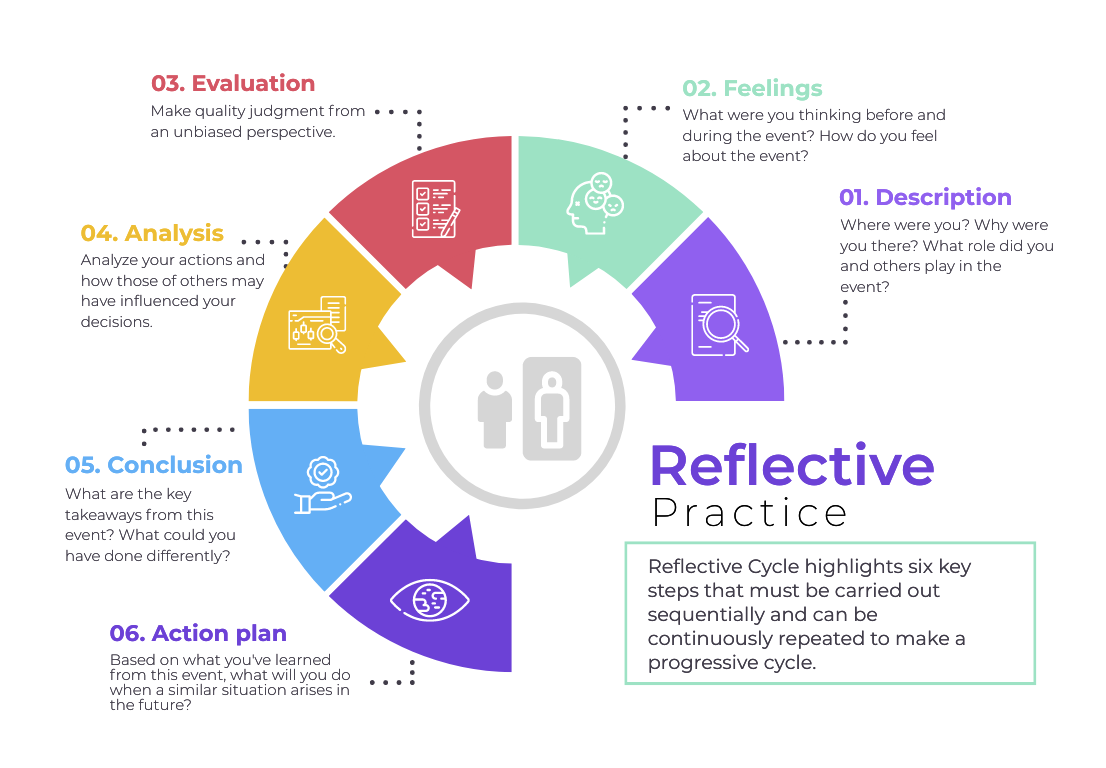Social work is very interesting, but it can also be demanding at times. It is a sensitive occupation that requires professionals to focus on job ethics to achieve their desired results. One long-standing practice that has been effective in helping social workers achieve their goals is reflective practice.
Here is a look at what reflective practice is and how you can use it in your career as a social worker.
What is reflective practice?
Reflective practice is the process of periodically introspecting on past actions and experiences in order to learn from them and make key decisions for the future.
This activity is considered essential for everyone, regardless of their age, profession or level of education. Reflection as we know it is necessary for helping us analyze situations to deduce key takeaways from them. However, the practice is very much emphasized in certain professions, such as healthcare, teaching and social work.
Reflective practice helps you as a social worker to recall interactions with clients and reflect on how things have worked out. This enables you to track errors, highlight the right choices taken, and design actionable steps or alternative approaches that allow for improvement in the future. The ultimate goal of reflective practice is learning and improving your performance as a social worker.
In your daily activities, you will always find something to reflect on, such as a long-term session with a client that ended well, a circumstance where a client broke down and threw tantrums during an interaction, or a query you received due to poor performance.
As a social worker, reflective practice should not just be seen as an exercise where you answer questions and check boxes routinely. It is a thoughtful activity that can help you become a better professional and find satisfaction in your job as a social worker.
If you are serious about improving in your career as a professional, you may want to consider obtaining a master’s degree if you have not already done so. A master’s degree can provide a major boost to your career growth and can give you leverage in finding high-paying jobs, even if you do not have previous work experience.
Social workers and aspiring social workers have several opportunities for obtaining a master’s degree, including online options such as the Spalding online master of social work program. Programs like Spalding’s social work graduate program allow you to enroll regardless of your previous educational background. The program also features fieldwork and a free placement service to help you identify an organization in your area where you can practice all that you’ve learned.
How can you deploy reflective practice as a social worker?
Over the years, and in several scholarly articles and self-help books, various steps have been outlined for correctly deploying reflective practice. Nevertheless, there are no hard and fast rules for doing this. What matters is that your reflection incorporates certain essential practices, such as those described in Gibbs’ Reflective Cycle.
Gibbs’ Reflective Cycle highlights six key steps that must be carried out sequentially and can be continuously repeated to make a progressive cycle. These processes are description, feelings, evaluation, analysis, conclusion, and action plan.

- Description: Here you recount what you are interested in reflecting on by accurately detailing the event. You will answer questions that can vary depending on the event. Where were you? Why were you there? What role did you and others play in the event?
- Feelings: Truthfully analyze the emotions you experienced and displayed during and after the event. What were you thinking before and during the event? How do you feel about the event? What do you feel about the event now?
- Evaluation: Identify the good and bad sides of the event. Make quality judgment from an unbiased perspective.
- Analysis: Thoroughly explore the event. You may want to break it down into smaller sections and ask even deeper questions about each scene. Analyze your actions and how those of others may have influenced your decisions.
- Conclusion: What are the key takeaways from this event? What could you have done differently?
- Action plan: Based on what you’ve learned from this event, what will you do when a similar situation arises in the future?
Reflective practice is a widely embraced ethical standard used by social workers. In some organizations, it forms a part of the credentialing process for social workers. Ultimately, it will help you as a professional in the field of social work to improve your interactive skills with clients and ensure you achieve the best results as you help them pull through the challenges of life.






